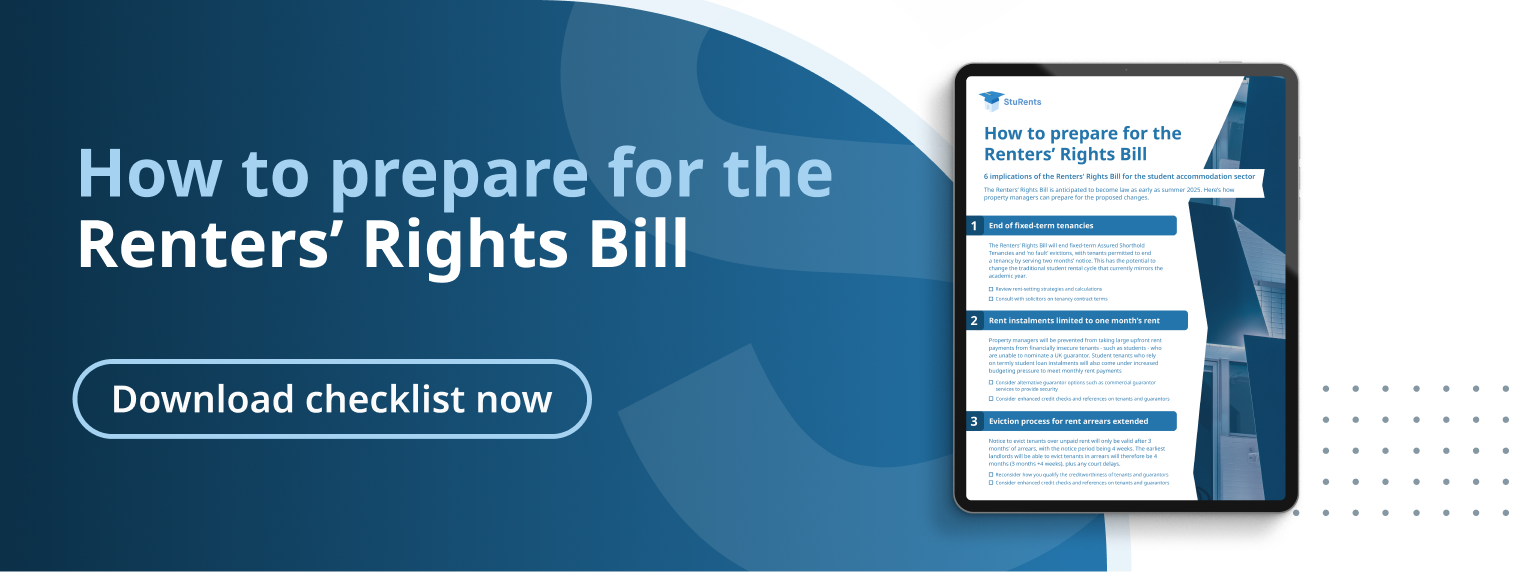
PBSA Exemptions in the Renters’ Rights Bill: What You Need to Know

Image courtesy of Adobe
“Will PBSA be exempt from the new Renters’ Rights Bill?” It’s a question I’ve seen come up several times from stakeholders in the industry.
It’s an understandable assumption, given the complexities surrounding PBSA and its relationship to tenancy law, however, this belief is not as clear or as straightforward as some may think. While it seems likely that the Government does intend for PBSA to be exempt from the Bill, the exact form of this exemption is still subject to interpretation.
The Renters’ Rights Bill and the PBSA Debate
The Renters’ Rights Bill has sparked renewed discussions about whether PBSA will be exempt from certain changes, particularly the abolition of fixed-term tenancies and the prohibition on rent periods exceeding one month. Many believe PBSA might follow the same path as universities which are deemed not to offer assured tenancies under the Housing Act 1988, gaining an exemption if they sign up to government-approved codes, similar to what was proposed in the now-defunct Renters’ (Reform) Bill in 2023. Indeed the Government has given a strong indication that it intends to exempt PBSA from the Bill.
But here’s where it gets tricky. The current draft of the Renters' Rights Bill doesn’t make a clear exemption for PBSA. The Explanatory Notes suggest that PBSA providers will be exempt from these changes, but this seems based on a misunderstanding. The notes in Paragraph 12 state:
“Purpose-Built Student Accommodation (PBSA) will be exempt from these changes as long as the provider is registered for government-approved codes, since these tenancies are not assured. Lettings by PBSA landlords will be governed by the Protection from Eviction Act 1977.”
The issue here is that the Explanatory Notes appear to naively assume that PBSA tenancies are not assured tenancies. The confusion likely stems from the apparent similarities between university halls of residence and purpose built accommodation blocks. The critical difference, though, is exclusivity. Universities have traditionally issued non-exclusive licences to occupy to student tenants because they retain the right to use their accommodation for commercial operations outside term time. PBSA, in contrast, are generally not permitted under local planning restrictions to use student accommodation for any other purpose, and most issue tenancies to students on an exclusive basis. So, most PBSA tenancy agreements are in fact ASTs, and under the current draft of the Bill, PBSA providers who issue these tenancies will need to revise their agreements since on the day the Bill is enacted their existing tenancies, most of which will have been signed months previously, will no longer be valid. Even if the Government extends the exemption currently enjoyed by universities, reclassifying PBSA tenancies as non-assured, most PBSA operators simply couldn’t change their tenancy agreements to licences.
Given that most PBSA operators currently issue ASTs, these providers will need to redraft their tenancy agreements when the Bill passes. PBSA providers might find themselves transitioning from ASTs to other tenancy types, such as common-law tenancies but this isn’t yet clear. There is certainly intent in Government for PBSA to be able to offer fixed-term agreements and, by virtue of being moved outside the scope of the Bill, to be able to continue to offer rent structures that are more suitable to student finances, but the exact legal framework and transitional arrangements are still to be communicated.The 2025/26 accommodation cycle will be kicking-off soon and nobody really knows whether the contracts they sign in October/November will have any legal standing in September.
Another challenge comes from what properties of a building are required to meet the definition of PBSA. There is currently no clear legal definition to draw on. It is easy to label a 40-floor newly-built building stuffed full of students as PBSA, but what about a recently converted pub with 15 reasonably priced individually lockable rooms exclusively let to students? Both could be signed up to ANUK but are objectively very different.
Is PBSA Exempt from the Renters' Rights Bill?
If the Government moves forward with the expected exemptions, most PBSA tenancies will likely be removed from the scope of the Renters' Rights Bill, though considerable work is likely to be needed to transition existing tenancy agreements to a new form in the coming months. PBSA operators need clarity very soon to be able to make the changes necessary in time for the 25/26 booking cycle.
Potential Impact on the Build-to-Rent Sector
One of the key concerns in the industry is how this exemption could give PBSA a potential advantage over the Build-to-Rent (BtR) sector. PBSA providers could potentially avoid the Bill's restrictions on fixed-term tenancies, while BtR operators remain bound by these new rules. However, this potential market imbalance should be viewed with caution. Although PBSA exemptions seem likely, the specifics of the exemption and its exact impact on the BtR sector remain speculative. There is still a possibility that the Government could introduce broader legislative reforms or adjustments that affect both sectors, reducing or eliminating any perceived advantage for PBSA.
While PBSA may gain some form of exemption through updated regulations, the process won’t be straightforward. Providers will likely face challenges, especially if students are housed in both fixed-term and rolling tenancies during different stages of their time at university. This could create confusion and administrative difficulties for PBSA operators, as well as complications for students themselves.
Get Ready for the Renters' Rights Bill Changes
To find out more about how the Renters' Rights Bill will impact the student accommodation sector and how you can prepare, download our checklist today.
Want to stay updated on the latest legislative changes in student housing? Follow StuRents here.
*Note: The views in this article are my own, based on publicly available information, and do not constitute legal advice or the official stance of StuRents.
Share


